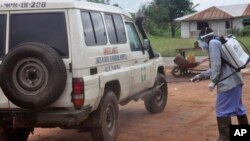Liberia is ramping up its surveillance efforts again as it battles the latest outbreak of Ebola. Two more infections have been confirmed, putting the number of recent cases at five.
John Sumo, the health promotion director at Liberia’s Ministry of Health, said the two newest cases are under investigation and it isn't clear where the patients contracted the disease.
“One thing we want to emphasize is taking all the preventive measures. It has been determined that baboons, fruit bats could be possible carriers so we have to be mindful not to be eating those animals,” he said.
Christopher Dumpoe, the spokesman for the community of Nedowein, where the new cases have been, says most people have adapted a new way of life.
“Everyone has been glued to their houses and are not moving around. They are happy that NGOs have come to the aid,” he said.
The World Health Organization representative in Liberia, Dr. Alex Gasasira, said the surveillance system in the country is fully operational.
“When the initial case was confirmed, several of the contacts had moved out of the location," he said. "All the contacts of the confirmed cases are accounted for and are closely being followed up every day.”
As Liberia works to contain the outbreak, the United Nations also is focusing on Ebola. Secretary-General Ban Ki-moon is holding an international conference on Friday to mobilize the resources to help Liberia, Guinea and Sierra Leone recover from the epidemic.
Philip Ireland, an emergency medicine physician in Monrovia and an Ebola survivor, says an essential part of that effort must be training.
“For example you put a paramedic, a doctor, a nurse from other countries on the ground and we learn from them through apprenticeship. After they leave, we’ll have four or five other people that can do that job,” he explained.
That’s better than just throwing money at the countries, Ireland said.
Prince Collins in Monrovia contributed to this report.












